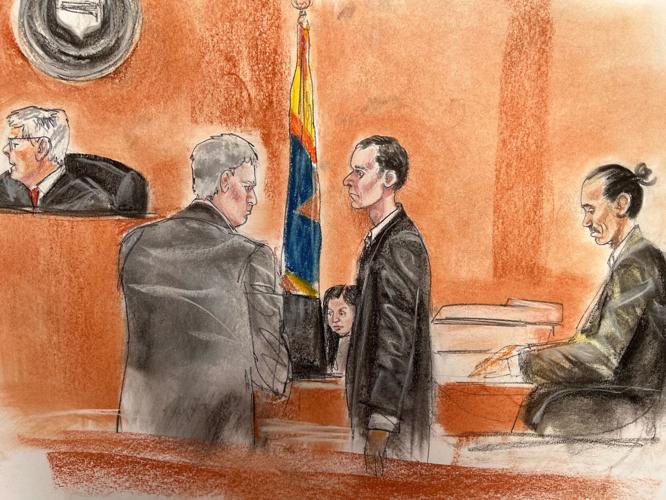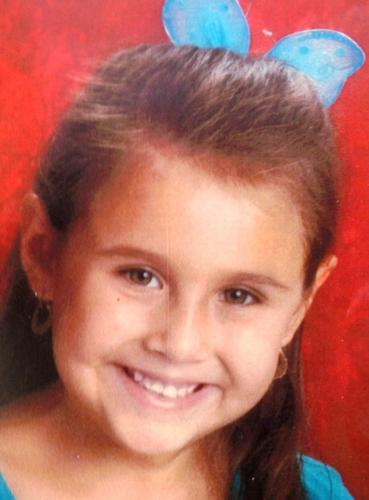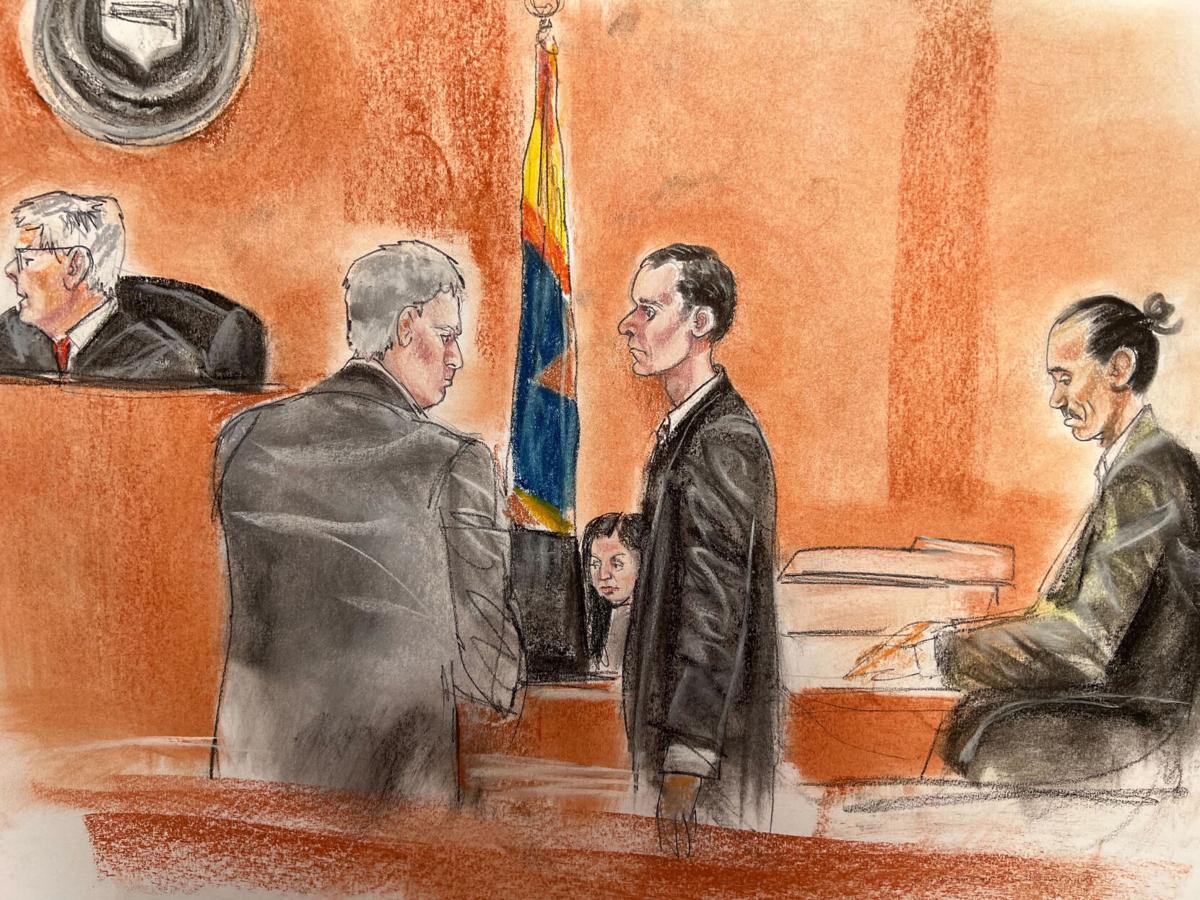Four of the jurors from Christopher Clements’ recent mistrial said the deadlock stemmed from one person who refused to deliberate and would not vote to convict based on the standard of proof used in criminal trials.
The jurors who spoke with the Arizona Daily Star said they had no doubt about Clements’ guilt in the kidnapping and slaying of Tucson 6-year-old Isabel Celis, and they feel they let the Celis family down by their inability to convict.
“We did do everything we could to deliberate honestly, fairly, justly, and at the end, we hope they understand we did the very best we could,” said one juror.

Isabel Celis
“We had a little girl counting on us. We had a family who was grieving, who is still grieving, who was counting on us.”
“I hope they can sleep at night,” another juror said of the holdout, who could not be reached by the Star for comment.
“Because for me now, when I see kids walking down the street by themselves and I think about my son, it’s unforgivable to me that they were absolutely closed down. There was no discussing the evidence that was really there,” the juror said.
Clements was charged in 2018 with the separate kidnappings and killings of Isabel and 13-year-old Maribel Gonzalez.
Isabel was discovered missing from her bedroom on the morning of April 21, 2012. Maribel disappeared on the way to a friend’s house on June 3, 2014. Maribel’s body was found days later in a desert area off of Avra Valley and Trico roads, near where Isabel’s remains were eventually recovered.
Clements was not identified as a suspect in either case until 2017, when he led investigators to Isabel’s remains in exchange for the dropping of unrelated charges. He was found guilty last year by a separate jury in Maribel’s abduction and was sentenced to natural life in prison for first-degree murder and to another 17 years for kidnapping, which will be served consecutively.
Jurors in Clements’ trial in Isabel’s case heard from 30 witnesses over the course of 10 days. They deliberated for two days before Pima County Superior Court Judge James Marner declared a mistrial on March 3 based on the jury’s inability to reach a unanimous decision.
The four jurors from that trial spoke to the Star on the condition of anonymity.
They said they want the Celis family to know they didn’t buy into the defense’s claims that Isabel’s father, Sergio Celis, had anything to do with her disappearance.
While they said the defense did a good job of planting a seed of doubt that maybe someone in the house helped Clements, it wasn’t something they considered during deliberation because of the lack of even circumstantial evidence for the defense theory produced during the trial’s opening statements.
‘No doubt in my mind’
Prosecutors told jurors from the start that there would be no direct evidence tying Clements to the crimes, but that there was an overwhelming amount of circumstantial evidence to connect him.
During trial, they showed jurors evidence that Clements’ phone was near the Celis house in the early morning hours the day Isabel was reported missing. Hours later, when he told police he’d been at home asleep, his phone pinged off towers in the area where her remains were later found.
They heard testimony about more than 1,300 photos of young Hispanic girls found in secret folders on Clements’ electronic devices, many of the children in provocative poses or revealing clothing. They also learned that Clements’ phone made several calls to the Celis family’s landline six months before Isabel went missing.
They also heard from an ex-girlfriend about his unusual behavior the morning Isabel was reported missing and how he lied to police about where he was that morning.
“Listening to the family was probably the toughest part, because you would know how this impacted them mostly, right off the bat,” one juror said.
Another juror said they struggled the most listening to the 911 calls made to police the morning of Isabel’s disappearance.
“Hearing the son, Sergio Miguel, and the wife, Becky, just being hysterical was extremely difficult to hear,” they said. “And for me, seeing the photos and stuff that were found on his devices in the folders was pretty troubling.”
The four jurors all agreed that testimony by cell phone tracking expert Sy Ray was especially important evidence.
“There was no doubt in my mind that it was Christopher Clements’ phone and it was talking to a tower out in Avra Valley by Trico Road ... and they could place the phone in his hands,” one juror said. “(He) originally said he slept in until 11:30 or noon, but you could see he was texting, he was going out to the places they talked about and they showed his movements.”
The other three jurors agreed that by the time deliberations began, they were also firmly convinced of Clements’ guilt and understood they had an important decision to make.
11-1 on murder, kidnapping charges
The holdout juror was friendly with everyone during the trial, even bringing gifts for some of the jurors, but once deliberations began, things took a turn, according to the jurors who spoke with the Star.
After setting their deliberation schedule, the jury took a secret vote for each of Clements’ three charges. They said the count was 11-1 each on the murder and kidnapping charges and 8-4 on the burglary charge, in which Clements was accused of unlawfully entering the Celis house to take Isabel.
“We all looked at each other and the first thing I said is, ‘I’ll start,’” said one of the jurors. “I told them exactly how I felt, where I was and what I believed. To me, there was no doubt in my mind that Christopher Clements was guilty.”
The juror said that when deliberations began, almost everyone had something to say.
“We had been holding this in for three weeks and everyone wanted to say what they wanted to say. Except one juror. They refused to speak,” said the juror. “If we were deliberating, then we knew, just by talking to people, who was on the side of guilty and who was the one that had a doubt. But the juror in question was silent the entire time.”
The juror said it was frustrating for the others to try to get this person to engage in the discussion.
“When they decided to finally say something, they said, ‘I have evidence. I have my notes and there is no evidence that this man killed this little girl,’” the juror said. “For the 11 other jurors who were sitting around that table, it felt like we were punched in the gut.”
By the end of the first full day of deliberations, the vote to convict on the murder and kidnapping charges was firm at 11-1, according to the four jurors.
“When we came to the conclusion that it was just one and who it was, it was very hard,” said another juror. “You try to keep your cool and you try not to get nasty, and you don’t, because they have their rights. What bothered me is that they were unwilling to discuss anything.”
“There were times where we did yell, there were times that we cut each other off,” said one of the jurors. “We wanted to make sure that everyone understood how important this was not only to the state of Arizona, but to the Celis family.”
The juror said it was frustrating because everyone had so much to say and share, but the one juror refused to participate in the process upon which they had agreed.
Holdout wanted video or DNA evidence
Jurors also said that the person would not follow rules set by the judge. As deliberations became heated, the holdout juror told others that they wouldn’t listen to anything anyone else had to say and at one point, put their fingers in their ears and began talking loudly.
“The instructions clearly state that in a criminal trial, we’re supposed to be at a reasonable doubt level. That means you firmly believe something to be true and the instructions stated that there were very few certain things, but we’re not working on certainty here,” one juror said. “The juror that caused this to be a mistrial, they vocalized that they were not operating on the grounds of reasonable doubt and that they were operating on the grounds of beyond all doubt.”
Beyond a reasonable doubt means the evidence must be so strong that there is no reasonable doubt that the defendant committed the crime.
The jurors tried to explain that isn’t the level of certainty they have to reach, but the person said they needed more evidence.
“(They said) ‘I need something like a video that shows the crime in progress or DNA and all that kind of stuff,’ “ the juror said.
Another juror said that the holdout told the group, “I do not think I can stand in judgment of this man. It’s a life here.”
The jury sent a note to Judge Marner on the first day about the holdout’s refusal to deliberate and asked for guidance.
“We didn’t think it was going to fare well if the people who were supposed to be talking and coming up with a verdict is refusing to do their due diligence,” one juror said. “We got a message back from the judge that he would address it and nothing ever came of it.”
When jurors tried to get the holdout to discuss the evidence presented in the case, the person said they had nothing else to say and that the group knew where they stood.
The jurors said that the juror’s refusal to participate in the process could have resulted from “a deep misunderstanding” of the legal system.
They said they aren’t even sure that knowing about Clements’ previous conviction in Maribel’s death — which the jurors did not know until Marner provided them with details after the mistrial was declared — would have changed the holdout’s mind.
“The case was strong. But I think with this jury and (when it comes to) evidence, they would have had needed to present something for that juror to firmly believe this defendant was guilty,” one juror said. “I think it was just that person was expecting more than what was given and that’s all they could see.”
‘I think about it every day’
The four jurors said that nearly two weeks later, the trial feels very fresh and their emotions are still running high.
“I think about it every day. During in trial I’d think about it and go home and think about everything I heard, but it’s a different feeling thinking about it now knowing that we failed,” one said. “That’s how I feel. We failed the family. And they have to do it again,” because a retrial is planned. “And that’s where I hope (the holdout juror) can sleep at night, because (the family) didn’t need to do this again.”
Another juror said they don’t know much about the holdout, but that their actions when it came time to deliberate were unacceptable.
“I can’t necessarily speak to the person’s character or anything like that, but I think it’s frustrating when so much time, effort and emotional energy was put into this and someone is essentially just unwilling to look at the facts for face value,” the juror said.
One of the jurors said they think the holdout should have spoken up at the beginning of trial to say they couldn’t convict a person based only on the reasonable doubt standard.
“My one message to any prospective juror ... is that if you cannot operate in the guidelines they say, you can just raise your hand and ask to be excused,” the juror said, adding that two people were excused on the first day after saying they could not be impartial. “If you can’t work under those guidelines, you need to step off and make sure the jury pool is containing the people who can.”
“All of us except for one really, really wanted to do right (by the family) the best way we could,” said another juror. “Unfortunately it came down to like a lottery. If that person had been picked as an alternate, it would have gone differently probably.”
The trial began on Feb. 14 and resulted in a Pima County judge declaring a mistrial on March 3. Video by Caitlin Schmidt / Arizona Daily Star






